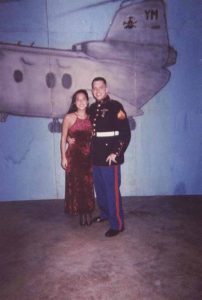Minutes after Breein Tyree stepped off the court following a win over Georgia — a game before which he and seven of his teammates knelt during the national anthem — he sent out a tweet.
“To the people that fight for this country, my teammates and I meant no disrespect to everything that you do for us, but we had to take a stand to the negative things that went on today on our campus. #WeNeedChange,” Tyree’s tweet read.
Tyree’s mentions were saturated with messages of support, many of which came from veterans and service members ranging from Vietnam era service to active duty.

U.S. Army veteran and former Mississippi Army National Guardsman Billy Jones is not a fan of using The National Anthem for protest, but fought to support American’s rights to do so. Photo courtesy Billy Jones.
“As a former Marine I applaud your efforts and your cause,” a Twitter response from Jesse Lyons read. “You do what you think is right.”
Lyons, who served in the U.S. Marine Corps from 1994-98, said he respects anyone willing to sacrifice for a greater cause.
“If it makes people uncomfortable, that is kind of the point,” Lyons said. “More specifically to this — or the NFL, even — I am highly sympathetic to the players’ cause. The Confederacy is a symbol of hate and treason. They fought a war to keep human beings as property. It’s gross and unacceptable.”
Lyons added that, among former veterans, he thinks he’s in the minority.
“I am not alone, but if I were to guess, vets that agree with me are outnumbered by those that don’t,” Lyons said. “But not by as much as you would think — maybe a 60-40 split.”
Use of the national anthem as a vehicle for peaceful demonstration entered the public discourse when Colin Kaepernick, former starting quarterback for the San Francisco 49ers, dropped to a knee during a preseason game in 2016 in protest of police brutality and systemic racism.
His decision to kneel was the result of a conversation with former Seattle Seahawks long snapper and U.S. Army veteran Nate Boyer. Boyer suggested that Kaepernick take a knee instead of sitting on the bench — which Kaepernick did during the national anthem before previous games — out of respect for the flag.
According to Billy Jones, former Mississippi Army National Guard member and U.S. Army veteran, no one person has the authority to decide whether a form of protest is appropriate.
“In the veteran community, our opinions are as diverse as the American population,” Jones said.
Jones noted he did not approve of using the national anthem for protest but acknowledged that the very reason he took up arms for his country was for people to possess the right to do so.
 “When I took my Oath of Enlistment, I swore to support and defend the Constitution,” Jones said. “To me, that means supporting all forms of free speech. From kneelers to flag wavers, we all have the same basic and fundamental right to say what we feel without fear of oppression.”
“When I took my Oath of Enlistment, I swore to support and defend the Constitution,” Jones said. “To me, that means supporting all forms of free speech. From kneelers to flag wavers, we all have the same basic and fundamental right to say what we feel without fear of oppression.”
In his postgame comments, Tyree repeatedly clarified that the silent protest was in response to the neo-Confederate sympathizers marching on campus — not out of disdain for servicemen and women or the American flag.
It was a one-time occurrence. In the following games, all fifteen players stood, heads high, for the anthem.
Still, the protest sparked outrage.
“Wrong time,” “This is so incredibly disrespectful to the troops,” “Don’t use the national anthem to protest!!!” some said.
However, Michael Weldon, the newly minted president of the Ole Miss Student Veterans Association, thinks it’s all about freedom.
“It doesn’t matter what people think about the protest but, rather, that people are free in this country to do what they do,” Weldon said.
Two days after eight members of the Ole Miss basketball team knelt, the Student Veterans Association released a statement in support of the players’ right to peacefully protest.
“We support acts of protest that stand against racism,” the statement read.
The conversation surrounding kneeling during the anthem will continue, and like in any modern political debate, a winner will likely not arise. Weldon doesn’t think that matters, though. He believes everyone won that Saturday.
“We have come a long way in this country,” Weldon said. “I think people get lost in their own views instead of celebrating what happened that day to a larger scale: Freedom happened there.”






